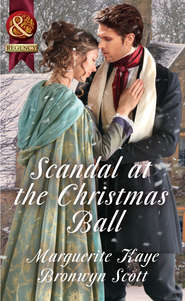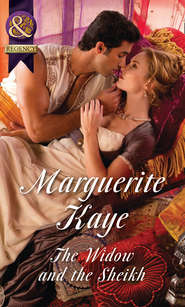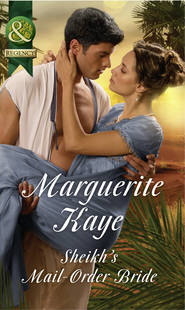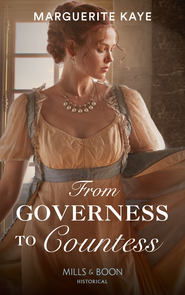По всем вопросам обращайтесь на: info@litportal.ru
(©) 2003-2025.
✖
A Winter Wedding: Strangers at the Altar / The Warrior's Winter Bride
Настройки чтения
Размер шрифта
Высота строк
Поля
She had to speak to Innes. She had a perfect right to demand that he allow her to do the task he had brought her here for. The fact that he was obviously floundering made it even more important. Yes, it also made him distant and unapproachable, but that was even more reason for her to tackle him. Besides, she couldn’t in all conscience remain here without actually doing what she’d already been paid to do. She owed it to herself to speak to him. She had no option but to speak to him.
Mentally rehearsing various ways of introducing the subject, Ainsley wandered through the castle’s neglected grounds, finding a path she had not taken before, which wended its way above the coastline before heading inwards to a small copse of trees. The chapel was built of the same grey granite as the castle, but it was warmed by the red sandstone that formed the arched windows, four on each side, and the heavy, worn door. It was a delightful church, simple and functional, with a small belfry on each gable end, a stark contrast to the castle it served.
The door was not locked. Inside, it was equally simple and charming, with wooden pews, the ones nearest the altar covered, the altar itself pink marble, a matching font beside it. It was clean swept. The tall candles were only half-burned. Sunlight, filtered through the leaves of the sheltering trees and the thick panes of glass in the arched windows, had warmed the air. Various Drummonds and their families were commemorated in plaques of brass and polished stone set into the walls. Presumably their bones were interred in the crypt under the altar, but Ainsley could find none more recent than nearly a hundred years ago.
Outside, she discovered the graveyard on the far side of the church. Servants, tenants, fishermen, infants. Some of the stones were so worn she could not read the inscription. The most recent of the lairds were segregated from the rest of the graveyard’s inhabitants by a low iron railing.
Ainsley read the short list on the large Celtic cross.
Marjorie Mary Caldwell
1787-1813, spouse of
Malcolm Fraser Drummond
This must be Innes’s mother. Below her, the last name, the lettering much brighter, his father:
Malcolm Fraser Drummond
Laird of Strone Bridge
1782-1840
The laird had married early. His wife must have been very young when she had Innes. Ainsley frowned, trying to work out the dates. Seventeen or eighteen? Even younger when she had her first son. Her frown deepened as she read the lettering on the cross again. Above Marjorie was the previous laird. Nothing between her and Innes’s father. Innes’s brother was not here, and she was certain he was not mentioned in the church. Perhaps he was buried elsewhere? What had Innes said? His brother’s death had been the trigger for the split between Innes and his father, she remembered that.
She could ask him. Taking a seat on the stone bench by the main door, Ainsley knew she would not risk antagonising him. She began to pick at the thick rolls of moss, which were growing on the curved arm of the seat. Theirs was a marriage of convenience. Her role as Innes’s wife was a public one—to appear on his arm at church on Sunday—and not a private one. She had no right to probe into his past, and she would not like it if he questioned her on hers.
Which did not alter the fact that he was preventing her from helping, and he quite patently needed help. She was bored, and she felt not only useless but rather like an outcast. What would Madame Hera say?
Wandering back along the path, with the sky, not surprisingly, now an ominous grey, Ainsley was thankful that Madame Hera had never been consulted on such a complex problem. There were a score of letters Madame Hera still had to answer, including the one to Desperate Wife. Was there an argument to defend the mother-in-law’s precious household manual? Perhaps there were traditions, comforting customs, that Desperate Wife’s husband valued or enjoyed, which he feared would be lost if the manual were ignored? Perhaps these very traditions were helping the husband adjust to his new life. Madame Hera rarely concerned herself with the men at the root of her correspondents’ problems, but it must be supposed that some of them had feelings, too. Perhaps Desperate Wife might have better success with what she called her wifely wiles if she put them to a more positive use, to discover what parts of the dratted manual actually mattered to him? Though of course, there was always a chance it was simply the case that he simply did like to have kippers on a Thursday.
‘I am glad one of us has something to smile about.’ Innes was approaching the front door from the direction of the stables. His leather riding breeches and his long boots were spattered with mud, as were the skirts of his black coat. He had not worn a hat since he’d arrived at Strone Bridge, and his hair was windswept. ‘What is so amusing, assuming it’s not my appearance?’ he asked, waiting for her on the path.
‘Kippers,’ Ainsley replied, smiling. He looked tired. There were shadows under his eyes. She had missed him at breakfast these past few days. ‘You do look a bit as if you’ve been dragged through a hedge backwards. A very muddy hedge,’ Ainsley said. ‘I’ll speak to Mhairi when we get in, I’ll have her heat the water so you can have a bath. The chimney has been swept, so it shouldn’t take long.’
Innes followed her down the hallway to the sitting room that doubled as their study. ‘Thank you, that sounds good. Where have you been?’
‘I came across the chapel. I saw your father’s grave.’
He was sifting through the pile of mail that Mhairi had left on the desk and did not look up. ‘Right.’
She wondered, surprised that it had not occurred to her until now, whether Innes himself had seen it. If so, he had made no mention of it. Another thing he would not talk about. ‘I’ll go and speak to Mhairi,’ Ainsley said, irritated, knowing she had no right to be, and even more irritated by that fact.
* * *
When she returned, bearing a tea tray, Innes was sitting at the desk reading a letter, but he put it down as she entered and took the tray from her. ‘I think half the population of Strone Bridge must now be in Canada or America,’ he said. ‘We’ve more empty farms than tenanted ones.’
She handed him a cup of tea. ‘Why is it, do you think?’
‘High rents. Poor maintenance—or more accurately, no maintenance. Better prospects elsewhere.’ Innes sighed heavily.
‘I know nothing about such matters, but even I can see from the weeds growing that some of the fields have not been tilled for years,’ Ainsley said carefully. ‘Is the land too poor?’
‘It’s sure as hell in bad heart now,’ Innes said wretchedly, ‘though whether that’s through neglect or lack of innovation, new methods, whatever they might be. There are cotter families who have lived in the tied cottages for decades who have moved on. I’m sick of hearing the words, “I mentioned it to the laird but nothing happened”. My father’s factor apparently left Strone Bridge not long after I did, and he did not employ another, though no one will tell me why. In fact, no one will tell me anything. They treat me like a stranger.’
‘What about Eoin?’ Ainsley asked tentatively.
‘What about him?’
‘You said he was your friend. Couldn’t you talk to him?’
‘Eoin is as bad as the rest. It doesn’t matter, it’s not your problem.’
Innes picked up another letter. As far as he was concerned, the conversation was over. It’s not your problem. Ainsley sat perfectly still. The words were a horrible echo from the past. How many times had she been rebuffed by John with exactly that phrase, until she stopped asking any questions at all?
‘Don’t say that.’
Her tone made Innes look up in surprise. ‘Don’t say what?’
Ainsley stared down at her tea. ‘It is my problem. At least it’s supposed to be. It’s what you brought me here for, to help you.’
‘This place is beyond help. I can see that for myself.’
‘So that’s it? You’ve already decided—what? To sell? To walk away and let it continue to crumble? What?’
‘I don’t know.’
‘So you haven’t decided, but you’re not going to ask me because my opinion counts for nothing.’
‘No! Ainsley, what the devil is the matter with you?’
‘What is the matter?’ She jumped to her feet, unable to keep still. ‘You brought me here to help! You have paid me a considerable sum of money, a sum I would not have dreamed of accepting if I thought all I was to do was sit about here and—and fluff cushions.’
‘You’ve done a great deal more than that. I’m sorry if I have seemed unappreciative, but—’
‘I have done nothing more than Mhairi McIntosh could have done. Oh, granted, I married you, and in doing so allowed you to claim this place, which seems to me to have been a completely pointless exercise, if all you’re going to do is say that it’s past help, and walk away.’
‘I didn’t say I was going to do that. Stop haranguing me like a fishwife.’
‘Stop treating me like a child! I have a brain. I have opinions. I know I’m a Sassenach and a commoner to boot, but I’m not a parasite. I may know nothing about farming, but neither do you! Only you’re so blooming well ashamed of the fact, though you’ve no reason to be, because why should you know anything about it when you told me yourself your father did not allow you to know anything, and—and...’
‘Ainsley!’ Innes wrested the teaspoon she was still clutching from her clenched hand and set it down on the tea tray. ‘What on earth has come over you? You’re shaking.’
‘I’m not,’ she said, doing just that. ‘Now you’ve made me lose track of what I was saying.’
‘You were saying that I’m an ignoramus not fit to own the lands.’
‘No, that’s what you think.’ She sniffed loudly. ‘If I could have got by without asking Mhairi for advice on this house, I would have, but I couldn’t, Innes.’











